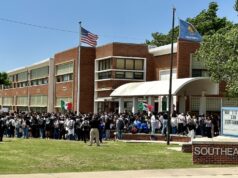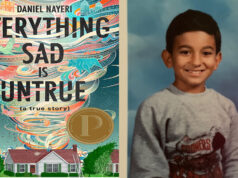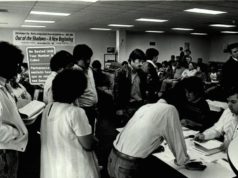One of the most inspiring things I’ve ever experienced was the opening reception for Diary of Some Webster Kids: Advocacy in Action on May 24 at Commonplace Books. Middle school English-language learners from Oklahoma City’s Webster Middle School wrote and edited this powerful anthology, which has since sold out of its initial run.
Some of the Webster students have been in the United States long enough to make articulate and witty presentations on the chapters they contributed. Meanwhile, the newest arrivals still struggle with speaking English. Still, they were able to draw on the assistance of teachers to write outstanding essays.

Stories of leaving their homelands
With assistance of paraprofessionals, a year-one newcomer, Darwin, wrote how he was raised by grandparents in Honduras. His grandfather died when he was 11, his grandmother became sick, and Honduras became too dangerous, so he “rode a bus on my own for almost 20 hours” to the U.S. border. The trip was frightening, but the immigration house was nice. Darwin concluded, “When I get to Oklahoma, I first looked at my parents. When I looked at them, I saw my prayers for the past 12 years.”
Another newcomer, Jose, dropped out of school in first grade to get a job carrying wooden pallets and cement for 100 pesos ($5.50) per day. Since he had been born in the U.S., the plan was to return at age 13. He was shaking with fear on the first day of school when he was greeted by Ms. Hinds. “At that moment,” Jose writes, “I think to myself, school is not so bad. I am going to be fine.”
Finding a new home
Most immigrants described mixed emotions about being forced to leave but expressed basically positive feelings about their new homes. For instance, Mar didn’t want to leave Mexico, and her home in Oklahoma City is “… actually worse than my house in Mexico.” Kids made fun of her because she only spoke Spanish, calling her a “beaner.”
“I felt like a tree alone in a big forest,” Mar concluded, “I wanted to die … but I kept being strong for my mom.”
Cristian described the pain of leaving his father, who could not afford the trip north but concluded:
Getting to Oklahoma I didn’t know anything … I still miss my family every day, but I think my parents made a good decision to move here. There is so much violence in Mexico and here I am safe and calm.
Similarly, Gabriel, who had been traumatized in a house fire, recalled the fearful trip to a new home and then concluded, “I love it better than Mexico. … ‘No matter if something bad happens, because something good can come around,’ says my mom.”
Familial struggles
Numerous chapters described the complexity of relationships in situations where many families face severe health struggles. Jasmine’s sister was born premature after going to the emergency room. Pricila wrote of her mom’s pregnancy when she lost a baby, but then, “My little sister was born at the right time and was healthy.” And Yadira was shaken when returning to school after her sister’s surgery, and “everyone started calling me names and made fun of me.” Her sister recovered and was released from the hospital. The bullying stopped, and friends started helping her out.
Family is a pervasive theme. Parents, grandparents and siblings – as well fellow students – repeatedly provide support to kids facing daunting circumstances. Family members and other suffering classmates often constitute parts of the challenges that the kids face. For example, they often struggle with depression as they wrestle with their families’ health problems.
Sheila listened when her mom criticized her sister in Mexico for not contributing enough for her grandma’s medical bills. Sheila wrote that her mom was like an “angry dinosaur,” but she herself was like a “nice dog” ready to help.
Cinthya’s mom suffers from depression, but the teen learned from her ordeals:
Even if you’re having a bad day and you feel like the world is falling apart, smile, because it’s much better sharing a smile than a bad vibe. … While I was hating myself other people were loving me for what I was.
Dealing with bullies
An anonymous writer recounted how she was bullied the most in fifth grade. Then, in seventh grade,“I got bullied again. I don’t know what I did wrong.” She suffered from depression and cut herself with razor blade. She consoled herself by listening to K-pop groups like BTS and SHINee. Her favorite member of that group, Jonghyun, killed himself and prompted her to return to the practice of cutting. Eventually, she reached a conclusion, drawing upon lyrics from her beloved pop stars:
“The only time you should ever look back is to see how far you’ve come.” (BTS 2015)
Max wrote about his “greatest friend” and how “the day he died was my greatest sorrow.” Max explained, “He always protected me and made sure no one was messing with me and then BAM! He was gone.” Recovery was assisted when a letter from his deceased friend was found: “Today is the day I finally let him go,” Max wrote.
Saddest of all, many faced bullying from adults, ranging from border patrol agents to local law enforcement officers. Aaron and his dad were followed by the police while driving home from Walmart. His dad was shaking as a policeman checked his papers. The cop returned them and falsely said that he’d stopped them because a tail light was out. When brushing his teeth that night, Aaron thought, “I don’t know why they pulled us over if the lights were working perfectly.
“I knew that no matter how smart, rich, or popular you are, someone will always judge you and treat wrong [sic] just because the color off [sic] your skin.”
The democracy we all deserve
These kids’ wonderful stories add to the multitude of reasons why we in Oklahoma City should thank them for making our schools and our shared community better. For instance, Queyla’s class was out of control, and a classmate encouraged her to intervene. She took control, asking one bully, “Why won’t you just shut the hell up?” When her friend, Ruby, saw how the intervention worked, she asked Queyla whether she’d do it again. The student leader said, “Somebody has to stop this crap someday to have our education,” and then she challenged her classmate to do the same, “Okay Ruby it’s your turn to kick.”
A different challenge was faced by Rito, who wrote: “May 27, 2016: Final day of 6th grade.” His grades weren’t good, so, “I got home at 3:25pm stressed out and I said to myself … ‘I’ve got a lot of work to do.’” Rito studied an hour a day during the summer and next year he earned a 3.4 grade-point average, even though he failed an end-of-year standardized test and barely passed another. Rito then articulated the stick-to-it-ness that these immigrants bring to America: “Now I know that no one can keep me from having good grades.”
That should be a lesson for all Americans. We don’t have to let our fears keep us from continuing to share the American Dream. These resilient middle-schoolers are showing the way toward the democracy we all deserve.






















